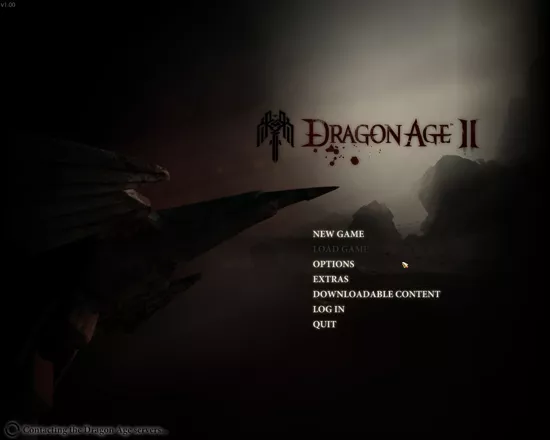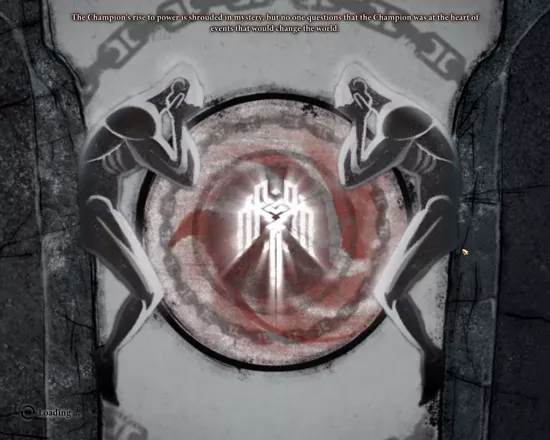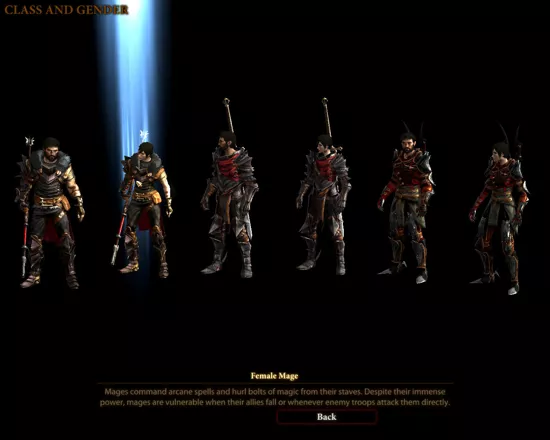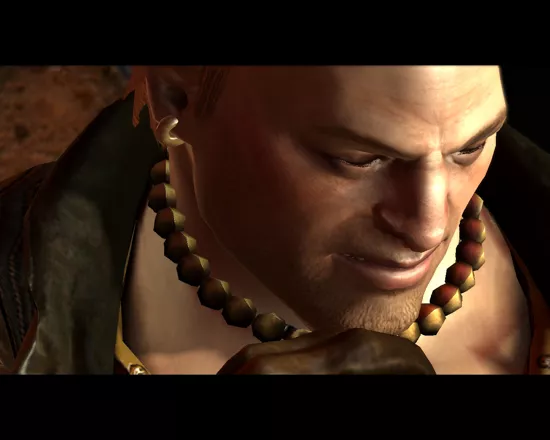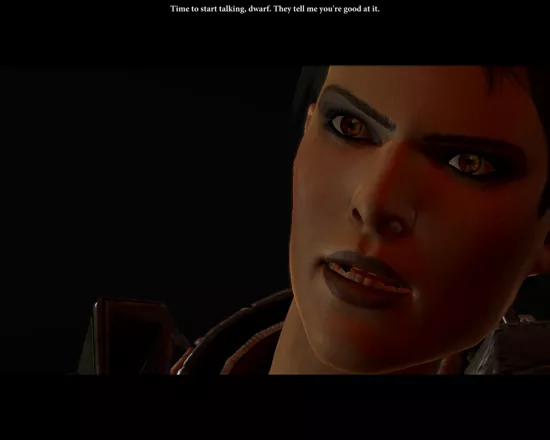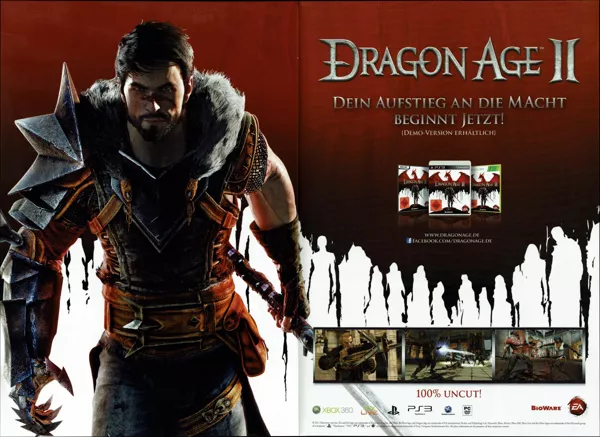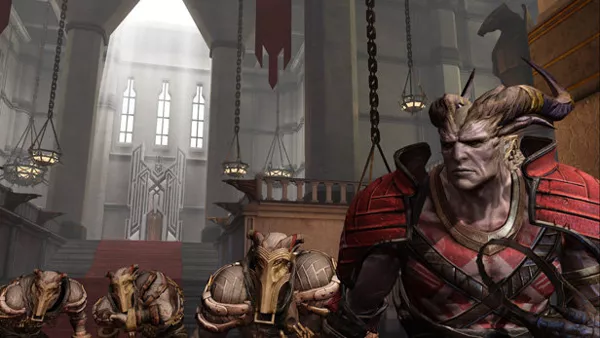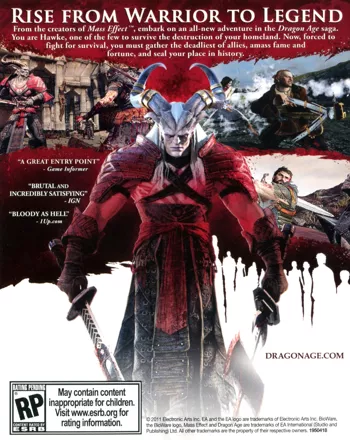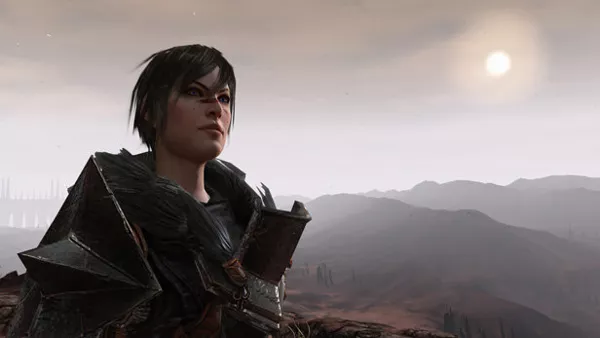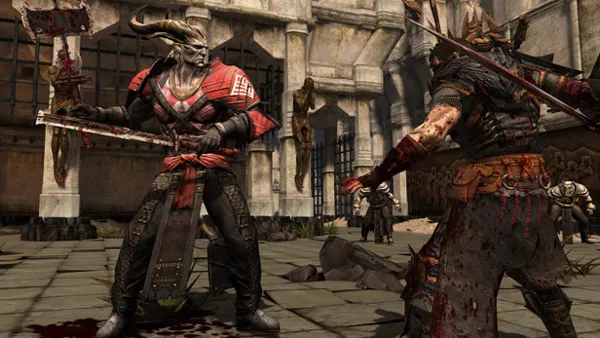Dragon Age II (2011) - MobyGames (original) (raw)
- Overview
- Credits
- Reviews
- Covers
- Screenshots
- Videos
- Promos
- Trivia
- Specs
- Releases
- Patches
- Prices
- Forum
- Contribute
Note: We may earn an affiliate commission on purchases made via eBay, Amazon and GOG links (prices updated 11/19 4:34 AM)
Add-on (official)
Included in
Special Edition
Description official descriptions
Dragon Age II is a sequel to Dragon Age: Origins.
One of the key events early in the first game was the destruction of the village Lothering by the Darkspawn. However, we weren't told that there was at least one person who survived the onslaught: a human named Hawke. Having become a refugee, Hawke travels to an area known as the Free Marches - more specifically, the city of Kirkwall. Hawke's family shares the fate with many other Ferelden refugees; the authorities of Kirkwall are suspicious of the newcomers, and the path to financial stability is anything but easy. Meanwhile, the appearance of the mysterious race of Qunari heralds more trouble to the inhabitants of Kirkwall, as does the growing tension between the Templars and the mages. Hawke is caught in the middle of these political and social conflicts - what shall be the hero's own path?..
Dragon Age II uses a "framed narrative" format: the story is narrated over a decade later by one of Hawke's companions. Similarly to Alpha Protocol, the narrative is rather flexible; motivations and events vary depending on the player's moral choices during the game. The game also adopts the "wheel-based" dialogue system from Mass Effect series: short responses that reflect different tones and attitudes the player wishes to choose for Hawke. Also similarly to Mass Effect, the main character's race and name cannot be changed; however, everything else (appearance, gender, classes) can be freely customized.
The combat system is quite similar to the one used in the previous Dragon Age game (which, in its turn, dates back to the combat style used in Baldur's Gate I and II), though it has been noticeably sped up. Hawke can only be human, but the player can customize his or her physical appearance and character class (warrior, mage, or rogue). The player controls Hawke and up to three active party members, either "programming" their actions by assigning actions that should be taken under certain conditions (for example, healing a party member if his HP drops below 20%), or issuing commands to each character manually. The ability tree is also similar, the player being able to learn new abilities as the characters level up. Many abilities from the first game return, but some are absent or replaced with new ones. The abilities are divided into various disciplines, which correspond to the fighting style of the character.
Spellings
- ドラゴンエイジⅡ - Japanese spelling
Groups +
- Dragon Age series
- EA Classics releases
- EA Value Games releases
- Fantasy creatures: Dragons
- Fantasy creatures: Dwarves
- Fantasy creatures: Elves
- Fantasy creatures: Golems
- Gameplay feature: Armor / weapon sets
- Gameplay feature: Brothels
- Gameplay feature: Character development - Skill distribution
- Gameplay feature: Dating / Romance
- Middleware: FaceFX
- Middleware: Scaleform GFx SDK
- Middleware: Umbra 3
- Physics Engine: PhysX
- PlayStation 3 Essentials Range releases
- Portability Engine: Cider
- Protagonist: Female (option)
- Protagonist: Visually customizable character
- Sound engine: Wwise
Screenshots
Promos
Videos
Credits (Windows version)
715 People (694 developers, 21 thanks) · View all
Reviews
Critics
Average score: 79% (based on 138 ratings)
Players
Average score: 3.7 out of 5(based on 72 ratings with 5 reviews)
An admirable idea with unfortunate execution.
The Good
Bioware's kind of been stuck in a rut for awhile. KOTOR was a huge deal for the company, but every game they've released since then has just felt like a retread of it. Solve the problems of three quest hubs with binary decisions then move on to the final quest hub while gaining influence from your party members with your decisions. Dragon Age II tries to break from that, being instead about the long-term consequences of the Champion's actions on the city of Kirkwall, which would have been a game I'd loved to have played.
As is typical of Bioware RPGs the player's party is composed of a small group of developed characters. One character, Aveline, stands out as possibly my favorite character from a Bioware game. Indeed Dragon Age II is more her game than it is Hawke's; she's at the center of more major plot points than Hawke is, and she only pulls the player avatar in to help her out with them. Some characters, like Varric and Fenris, are entertaining or have engaging back-stories/quest lines, while others, like Isabella and Merrill, seemed to have been hastily grafted into the game only to add additional characters to the playable party. Also having Anders's entire transformation from the lovable scamp of Awakening to the brooding cynic of DAII happen between games instead of during the game was one missed opportunity out of many.
Incidentally, if you've ever wanted a Xena: Warrior Princess game that isn't completely awful, Dragon Age II might be worth picking up. The female Hawke is a decent Xena sound-a-like, one of her pre-set faces is a dead ringer for Lucy Lawless, and Merrill is even a pretty close analog to season 1 and 2's Gabrielle.
The Bad
Any good things I've said about the game above can be safely ignored. The actual execution of the game is so half-assed and amateur that whatever strengths the game has are hidden behind piles of bland tripe. It'd be nice if I could say that the game was a victim of its release schedule, but I think it's worse than that. I think DA2 was intentionally designed to be as cheap and quick to develop as it is so that they could push it out and pick up some capital to continue developing The Old Republic with. Every part of DA2, from the good to the bad, was designed to be low-budget.
I should start with what ought to be the main character of Dragon Age 2: the city of Kirkwall. If you're going to set an entire RPG in a single city then you had better be putting a lot of effort into that city. Baldur's Gate and Baldur's Gate II: Shadows of Amn both thought so highly of their main city that they put the city name in the title! Even globetrotting games would put huge amounts of detail into their capital cities, such as Final Fantasy VII's Midgard or Morrowind's Vivec. Kirkwall has nothing in common with any of these cities. The town has an upscale neighborhood, two slums, a church, a bordello, a pub, and a government building. That's it. That's the entire city. Sure there are books you find that go into the lore of the town, but all they do is prove that all the interesting stuff happened to the town before you got there.
The time skips of the story are also equally under-developed. The prologue of the game races through what ought to be valuable character development as fast as it possibly can. This utterly destroys any sense of scale in regards to Hawke's rise to power; in half an hour she skips from refugee to well-known footpad in Kirkwall's underworld. Worse than that, however, is how little changes in the time skips. Every piece of architecture and every citizen in the city remains unchanged over the seven years that the game takes place. Only store inventories and the locations of some barrels change. I have never seen any game be so lazy about one of its key features. They could have reduced the time skips from being three years in length to being one month in length and nothing about the game would have to be changed.
Just as lazy is the storyline of Hawke's rise to power, which ought to be a key feature of the game since those exact words are on the back of the game's box. In truth her grand epic story is that she was friends with the captain of the guard, came into some money, and was in a position to duel two important personages. Nothing else in the game has lasting effects outside of the individual quest lines. For me the gold standard of "rise to power" video game stories remains Suikoden II, which had both a solid storyline focused on the player avatar as well as a mostly optional expanding base camp that grew from the player's actions. Dragon Age II ought to have both of these things, but it barely makes an attempt at either.
Something must be said for the game's combat, which is functional, I guess, but profoundly stupid. It's still based on a single player version of MMO combat, which is still not a bad idea, but it still doesn't care to learn how to do it right. I played through team and raid content in two expansions of WoW, so I'd like to think I'm qualified in speaking about how good MMO fights are made. Positioning, reading enemy patterns, and disabling enemy powers are all crucial elements. DA2 has none of this. Every fight in the game that isn't just a Dynasty Warriors style kill-em-all bloodbath can be beaten by nuking the enemy mage while distracting any adds that go for your mage. The most complex enemy in the game is dangerous because, while he will attack, sometimes he will also dash. Dragon Age 2 is like playing God of War with the enemies from Dragon Quest.
And how many adds there are! Every single combat in the game consists of at least three waves of enemies jumping into the fray; totally unfazed at how you cut down their allies in three hits. One quest in the game involves stopping a flood of poison gas that is killing a district of the city, and no less than 60 mercenaries jump into the gassed district in order to stop you. Some people must really love their job.
I want to compare this to Baldur's Gate II because I think it makes a good example of what a silly mess Dragon Age 2 is. In Baldur's Gate II the party could get ambushed, while walking between districts in Amn, by cutthroats. At the start of the game these confrontations could be dangerous, because while the cutthroats might not possess magical items they were still skilled fighters, and they had a wizard with them who knew the same common spells as the player's party's wizard. As the game progressed, and the party grew and acquired mystical and enchanted items, these attacks became trivial engagements, as the party had far surpassed simple hoodlums. In DA2 the street thugs are always evenly matched to the player, because someone somewhere thinks this is how game balance works. The only reason as to why there are street gangs that can match the abilities of the Champion of Kirkwall is because these are the high-level Act 3 thugs and not those low-level Act 1 thugs.
The Bottom Line
Dragon Age II is the game that people were worried Bioware would make when they signed a publishing deal with EA. It cuts every corner, puts in the barest minimum of effort, and was designed with the kind of disregard for craft typical of annual franchise games that are only living on their names.
I won't call Dragon Age 2 a scam, but it is a failure. Its ideas are worth revisiting, but I'm not sure I can trust a Bioware game with Dragon Age in the title anymore. How will I know if, this time, they actually are trying to make a proper game?
PlayStation 3 · by Lain Crowley (6629) · 2012
The Good
The story:
Compared to Dragon Age: Origins the characters are a lot more interesting and diverse. I ended up with using Anders, Varric and Merill as my core-group and I was surprised that even nearing the end of the game they would still talk with each other on a regular basis, with no conversations been repeated. In Origins the conversations stopped after an hour because they ran out of subjects to talk about.
The story is much darker and daring than the previous one. There is conflict between multiple (mostly religious) factions, innocents often end up dying due to politics our of their control and nobody seems to be safe from the works of satanic blood mages. Also big ups for allowing me to use my save from Origins in order to change events in this game.
Some of the quests I assumed were simple and unimportant side-quests would show up later in the story. It really shows everything was planned out really well.
Gameplay:
The combat is more chaotic, in Origins my favorite moment was right at the end during the showdown in Denerim because there were grunts all over the place that died in on or two hits. It didn't make the fights any harder, but it did make for a more epic feeling.
The game is a lot more linear, which means that you spend less time checking bloody side-paths and more time moving forward.
Figuring out what ability to choose is much easier now. Every type has one screen (swords, shields, entropy etc.) And there you see a useful screen showing what you can and can't pick. In Origins you had to scroll down one big list with all the types thrown together.
There is more combat and to me that is one big plus. They even removed the fights that happen whenever you travel somewhere almost entirely because there is a mob of enemies waiting around every corner.
Bugs that were fixed:
In Origins I always had a fight with the looting system because it would take a few seconds for non-humanoid enemies to become loot-able. Here it is fixed and that helps a lot.
People stopped randomly assaulting me while we were talking. I had that a lot in Origins and it was annoying!
The Bad
Presentation:
While Kirkwall is better for story, it doesn't really help the presentation. Everything is the same and you are going to miss Ferelden's variety in areas.
Besides the occasional interesting gory scene the game seems to phoned the blood in a bit. I only saw a handful of finishing moves as well and some of those were in cutscenes that were part of a quest. I did run into a dagger which made enemies explode when back-stabbed, that was pretty sweet.
Difficulty:
I would sometimes run into amazingly hard fights simply by walking into a random alley where a boss would spawn or attacking a single enemy that summoned a whole army of friends to help him. I always save before boss-fights when I know they are going to show up, but I can't possibly be prepared for some of these fights. I once accidentally walked right into a High Dragon, the hardest boss in the entire game.
The auto-save can be annoying at times. One time I died during a boss-fight and I forgot to save before entering his room, so I figured I would be placed back at the start of the castle I died in, but instead I got send back like thirty minutes and had to do all the choices and mini-fights all over again.
The Bottom Line
I would like to call Dragon Age 2 an improvement over Dragon Age: Origins. It is darker and more daring and the gameplay has improved (thanks in part to the removal of some very annoying bugs). The game's presentation may be a little lacking, but I am willing to ignore that.
Dragon Age 2 is much easier to pick up than the first Dragon Age game, so people who want to get into the franchise may find it easier to work through it backwards. Fans of the franchise will run into some frustration due to the many changes that were made, but this game does pay off in the end. A good game and a good sequel!
Xbox 360 · by Asinine (956) · 2011
Not quite the same, but still a good sequel
The Good
This game has a good story that builds off of your previous game's choices if you have a saved game from the first Dragon Age. This lets you feel like your choices have had an effect on the world as you start playing the sequel. The story itself may not be unique, but it is interesting and can keep you wanting to see more.
The graphics are very well done as you can usually expect from BioWare. High graphics settings work very well and look great even on lesser graphics cards. It shows how well you can do graphically without forcing players to get the absolute best graphics cards to experience it.
The dialogs are great and can be humorous. The character interactions are as enjoyable as in the original. It is very easy to learn to love or hate your companions and that is very important in a roleplaying game.
As in the original, you have a lot of control over how your character looks. It's always nice to have such control even if you don't see a whole lot of your character's face in the game.
The Bad
One very minor issue I have with this sequel is the choice of voice actors. I did not compare the credits with the original game, but some of the voices sounded the same even though the character was different. It is disorienting to hear the voice from a previous character used for a new character. They would have been better off having some more variety in the voice acting from that of the original, except with repeated characters (such as the return of HER -- if you played the game, you know who I mean).
I also miss the ability to put entire sets of armor on your companions. It isn't a huge concern, but when you have a pack full of different kinds of armor and can't let your companions use the majority of it, it takes away a lot from the game and is a large step backwards from most RPGs.
The achievements that you get are now on a "ribbon" that you move across. The original game had them in rows that allowed many to be displayed at once and made it easy to navigate. Now, you can see only a few at once and it's a pain to get a quick view of how many are left to unlock. It's definitely not game-breaking because you're not looking at that often, but it is worse than the original.
Character talents or skills are another thing that has gotten worse. In the original, they were in an easy to see format. Yes, they were more linear than they are now, but not by all that much. Now, you have to click on each category to see what is available and trying to see what requirements are needed to get the later skills takes more effort. They could have done a much better job laying out the skills than they did. Again, this is a minor issue, but it is another thing that went downhill.
The Bottom Line
This game is different from the original and that can be both good and bad depending on who you ask. The original was very well done and this game removed a number of things that made the original so much fun. Even so, if you're willing to take the time to get used to the differences, you will find that this sequel is still a great game.
Combat takes some getting used to after playing the original, but it doesn't take too long to no longer mind the differences. Gameplay itself is pretty much the same otherwise.
It looks from what I wrote above that there is more wrong with the game than right with it. That's really not true, though. Yes, the game isn't necessarily as good as the original because of some changes that really shouldn't have been made. However, none of these things are serious problems. They really only look bad when compared to the original. If you compare this game to different games, these issues really aren't issues anymore.
This game is a great game. The day I picked up my copy of the Signature edition, I started playing once I got home from work around 5:30 or 6:00pm. I played non-stop until about 11:15pm without realizing the passage of time. I hadn't even eaten dinner or had anything to drink. Few games draw me into them that well. I can play many games for that long without a problem, but I still notice the time. This game was just that engrossing.
Some of the changes may have been ill-advised, but it certainly is worth playing. If you enjoyed the original, you will enjoy this sequel. Just don't try holding it to the standards of the original, or at least be willing to get used to the differences.
Windows · by Riamus (8446) · 2011
Discussion
| Subject | By | Date |
|---|---|---|
| Is this how you're supposed to play it? | Slug Camargo (583) | Mar 27, 2011 |
| Abouth Bethany (spoilers alert!) | Klaster_1 (57605) | Mar 20, 2011 |
Trivia
Cancelled expansion
An expansion to Dragon Age II, named Exalted March, was planned, but cancelled before announcement. Bioware's reasoning was that other opportunities for the franchises came up, and that there was no room for it because Bioware's team sizes are fixed and all of them were busy with projects.
Awards
- 4Players
- 2011 – Biggest Disappointment of the Year
- GameStar/GamePro (Germany)
- 2011 - #3 PC RPG of the Year (Readers' Vote)
- 2011 - #3 Console RPG of the Year (Readers' Vote)
Analytics
Related Sites +
- Dragon Age II FAQs, Walkthroughs, Guides
posted on GameFAQs.com - Dragon Age II Strategy Guide
Mycheats "Super Guide" for the game - Dragon Age II Walkthrough
A walkthrough posted on IGN (includes the DLC The Exiled Prince) - Dragon Age II Wiki website
comprehensive information about Dragon Age II - Hints for Dragon Age II
Universal Hint System strategy guide with tips & tricks, cheat codes and solutions
Identifiers +
Contribute
Are you familiar with this game? Help document and preserve this entry in video game history! If your contribution is approved, you will earn points and be credited as a contributor.
- Ad Blurb (+1 point)
- Alternate Title (+1 point)
- Correction (+1 point)
- Critic Review (+½ point)
- Group (+¼ point)
- Product Code (+¼ point)
- Related Site (+1 point)
- Release info (+1 point)
- Relation (+½ point)
- Tech Spec (+1 point)
- Trivia (+1 point)
- Video (+1 point)
Contributors to this Entry
Game added by Unicorn Lynx.
Macintosh added by Jeanne.
Additional contributors: Jeanne, Patrick Bregger, Lain Crowley, Plok, Zhuzha.
Game added March 10, 2011. Last modified August 3, 2024.


